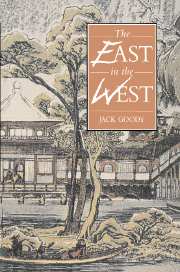Book contents
- Frontmatter
- Contents
- List of figures
- List of tables
- Acknowledgements
- Introduction: the West's problem with the East
- 1 Rationality in review
- 2 Rationality and ragioneria: the keeping of books and the economic miracle
- 3 Indian trade and economy in the medieval and early colonial periods
- 4 The growth of Indian commerce and industry
- 5 Family and business in the East
- 6 From collective to individual? The historiography of the family in the west
- 7 Labour, production and communication
- 8 Revaluations
- Appendix: early links between East and West
- Bibliography
- Index
3 - Indian trade and economy in the medieval and early colonial periods
Published online by Cambridge University Press: 05 June 2012
- Frontmatter
- Contents
- List of figures
- List of tables
- Acknowledgements
- Introduction: the West's problem with the East
- 1 Rationality in review
- 2 Rationality and ragioneria: the keeping of books and the economic miracle
- 3 Indian trade and economy in the medieval and early colonial periods
- 4 The growth of Indian commerce and industry
- 5 Family and business in the East
- 6 From collective to individual? The historiography of the family in the west
- 7 Labour, production and communication
- 8 Revaluations
- Appendix: early links between East and West
- Bibliography
- Index
Summary
In the previous chapter I began by looking at bookkeeping in medieval Italy and concluded by discussing the nature of accounting in India and elsewhere in Asia. The developments in bookkeeping, in company law, in banking and in commercial associations have been attributed by some historians to the growth of mercantile activity in medieval and Renaissance Europe. But we have seen that most of these activities were grounded in earlier practices in the Mediterranean. From this particular standpoint, the economic preconditions for the take-off that occurred in Europe existed much further back in time than modern historians have generally allowed. Even the economy of the ‘feudal’ period, following the decline of Rome, was more diverse than the term itself would suggest and various authors such as Pirenne and de Roover have discerned at least the shoots, if not the very beginnings, of capitalism.
Was this the case not only with Western ‘feudalism’ but with other contemporary societies elsewhere in the Old World? Marx and Weber thought not, for rather different reasons. Like many other, more recent writers they took as their starting point the Uniqueness of the West with respect to features determining the major transformation of society that could occur in western Europe alone. The reasons they sought partly in ‘Asiatic exceptionalism’, partly in the economic ethic and partly in other features thought to be present in the one and absent in the other.
- Type
- Chapter
- Information
- The East in the West , pp. 82 - 112Publisher: Cambridge University PressPrint publication year: 1996



